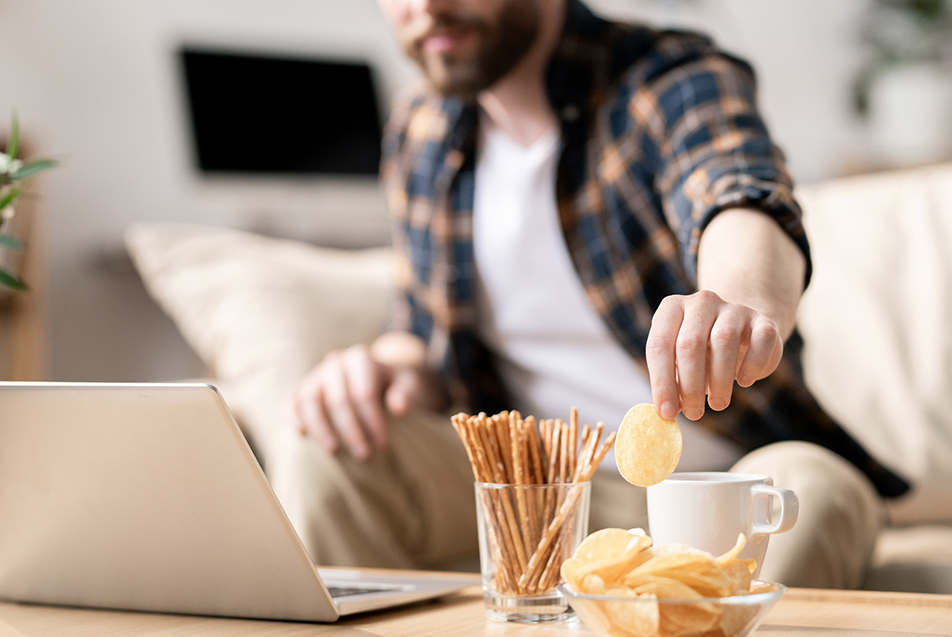
This post was written by Laura Oyer, PhD, HSPP, psychologist, Park Center Eating Disorders Program, Parkview Behavioral Health Institute; and Judy Tillapaugh, RD, LD, Parkview Hospital Randallia Nutrition Services.
When the pandemic entered our lives, many people noticed a shift in their eating patterns. For some, they found themselves having less of an appetite or intentionally limiting or controlling their food intake. Others noticed they were turning toward food and eating more than usual, impacting body image. Due to these changes, it would be easy for us to focus only on food and give some “helpful tips” on what to do to improve your eating or body image. However, if we did that, there’s a good chance we’d miss what’s really going on and you’ll still be stuck in the same place.
Often, when we struggle in our relationship with food, regardless of how severe this struggle is, food is rarely the main problem. Author and clinician, Anita Johnston, PhD, in her book, “Eating in the Light of the Moon” says, “… food is not the real issue. It is a smoke screen. It is the red herring.” She goes on to define a red herring as “… something designed to confuse or divert attention from something else.” If we spend all our time focusing on what we “should” or “should not” be doing with food, we are focusing on the wrong problem and not the true culprit.
The real issues
So what is the true culprit? Most of the time, the real issues are challenging and difficult emotions we are experiencing. These emotions are often caused by challenging life situations, difficult relationships, stressful events, challenging decisions we have to make or distress we cannot escape. If you think about all of the stress we have had this past year, all of the grief, sadness, loss, anger, anxiety, hopelessness, exhaustion, disconnection, it makes so much sense why many are using food to somehow feel a sense of control or find comfort and soothing. It’s like a weed; if we only focus on cutting off the top part of the weed (i.e., focusing on the food), then the weed will continue to grow back, until we dig up the roots (i.e., deal with the underlying emotions/situations). To really improve your relationship with food, you have to focus on both your relationship to food and your relationship to your emotions. Below, we will identify a few ideas on how to improve both of these areas.
Coping with emotional eating
To improve your relationship with your emotions, begin by welcoming them; don’t shy away from feelings. Be curious about what you are feeling and when you’re feeling it. Gently let yourself express whatever you are feeling. Ask yourself open questions to learn what you’re really experiencing and what the real needs are. Food is not the answer. Yes, it’s OK to eat to get instant gratification, comfort, pleasure and safety from food, however, notice if food and/or beverage portions go beyond one or two servings, or notice if you’re restricting food or consistently missing meals. Pay attention to irregular eating patterns, then be curious about your needs. Allow the discovery of what you truly need. You deserve it.
Progress to thinking about all the possible ways to satisfy your needs with kindness. Give yourself a personal brainstorming session. Make a list of thoughts and ideas. This may take a day or two or more and that’s fine. This is a journey not a race. After reviewing the list(s), decide what you’re ready to start applying to your life and practice the choices. Gradually or maybe quickly, you will adopt new day-by-day emotional coping skills to meet needs.
Here's an outline to help you embrace emotions, understand needs and recognize kind actions to help you handle struggles and stressors.
Coping with emotional eating
1. Notice the struggle, stressor and/or life change and name it.
Some examples: life challenge, difficult relationship, care giving, being alone
2. What am I feeling?
Express feelings by writing them down, journaling, talking to someone, crying or drawing them.
Some feelings you might be experiencing: grief, sadness, loss, anger, anxiety, hopelessness, boredom or loneliness
3. What do I need?
Some needs: safety, rest, friendship, belonging, pleasure, being understood, connection
4. How can I meet need(s) with kindness?
?Ideas:
- Plan for regular meals and snacks
- Seek nurturance, comfort with a pet, listen to music, play, partake in your hobbies, laugh, deep breathing
- Seek quality time to talk with friends and family daily
- Have refreshing movement most days of the week, like yoga, taking a walk, bike riding, fishing, yard care or dancing. Movement should not be focused on burning or losing something (i.e., weight), rather on restoring and giving
- Include positive distractors or “me time” like watching sports, TV shows, puzzles or reading books
- Ask for help at home and work
- Engage in spiritual practices like praying, meditating and singing
- Have a consistent sleep routine
5. Who can support me? What can I ask them to say or do?
People in our lives are there for us, but they can’t read our minds. Talk with them or write to them and let them know how they can support you. Check in with each other frequently during the week.
6. Identify what helps you with needs and make them a part of your life.
7. Begin to notice what helps you most and work to make this more of a practice/habit.
Intuitive eating
In addition to the steps listed above, here are a few additional intuitive eating strategies that may help support finding a more positive and balanced relationship to food.
- Recognize your relationship with foods and beverages and notice how it may change day by day. Some fluctuations are normal.
- Try to eat three meals per day with snacks if desired; however, do not have rigid, black-and-white rules.
- Eat meals and snacks that include all foods that are nourishing, gentle and satisfying.
- Favorite foods like desserts, snack foods, side dishes, or entrees are okay too! Don’t deny yourself something you like. Plan for it. Mindfully eat it and enjoy it.
- You might have a tendency to use foods or beverages as punishment, reward, or in an attempt to solve an issue; but food is not the issue. As struggles and stressors happen, seek a gentle, healthy relationship with food and allow yourself to use kind coping skills.
- It’s the “shouldn’t ever have this,” diet restrictions and other rules that can increase risk of over- or under-eating and trigger feelings of guilt and shame.
If you or someone you know could benefit from getting more support in improving their relationship with food or body image, contact the Parkview Behavioral Health HelpLine at (260) 373-7500 or (800) 284-8439, anytime 24 hours a day, and inquire about the Eating Disorder Treatment team through Park Center and Parkview. This program offers therapeutic, psychiatric, dietetic, and medical services to support recovery and lasting change.
Sources
Resch, E, Tribole E. (2020) “Intuitive Eating:4th Edition”; St. Martins Publishing Group. New York, NY
Johnston, A. (1996) “Eating in the Light of the Moon”; Gurze Books. Carlsbad, CA.



